Making Sense of President Trump’s Annexation Obsession
post by Annapurna (jorge-velez) · 2025-03-21T21:10:30.872Z · LW · GW · 3 commentsThis is a link post for https://jorgevelez.substack.com/p/canada-and-ai
Contents
An alternative explanation for why Trump wants to annex Canada The New Paradigm: An Explosion in Energy Demand Enter Canada What Could Canada’s Future Government Do to Ensure Alignment with the United States' AI Resource Goals? Addendum: What about climate change? None 3 comments
An alternative explanation for why Trump wants to annex Canada

For the past few months, the world has had to endure comments from President Trump and some of his most ardent supporters about annexing Canada and turning our country into the 51st state.
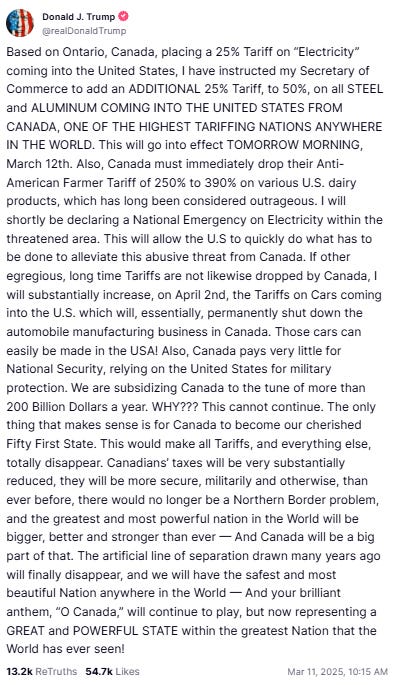
These comments have been universally rejected by Canadians, world leaders of Western democracies, and most of the American population, including many who voted for President Trump. Many in Canada are concerned about what this could mean for our sovereignty, and are trying to make sense of President Trump’s ambitions. Some believe that President Trump has imperialistic ambitions, similar to the ambitions of past Presidents such as William McKinley and Theodore Roosevelt. Others think that President Trump is simply out of his mind, possibly suffering significant psychological shifts following his assassination attempt in Butler, Pennsylvania.
I don’t subscribe to either theory. My belief is that a powerful group of bipartisan American interests convinced President Trump that there is an urgent need to secure and develop Canada’s vast energy and mineral sources. President Trump believes that annexing Canada is a way to satisfy this need.
The New Paradigm: An Explosion in Energy Demand
The arrival of Artificial Intelligence (AI) in our lives has raised various questions that society must address, one of them being how much energy this new technology will consume.
As AI technology continues to advance and integrate into daily life, stakeholders are convinced that it may soon be both compute-limited and power-limited. This is why the world’s largest technology companies are investing enormous amounts of money in capital projects aimed at meeting the forecasted demand for AI.
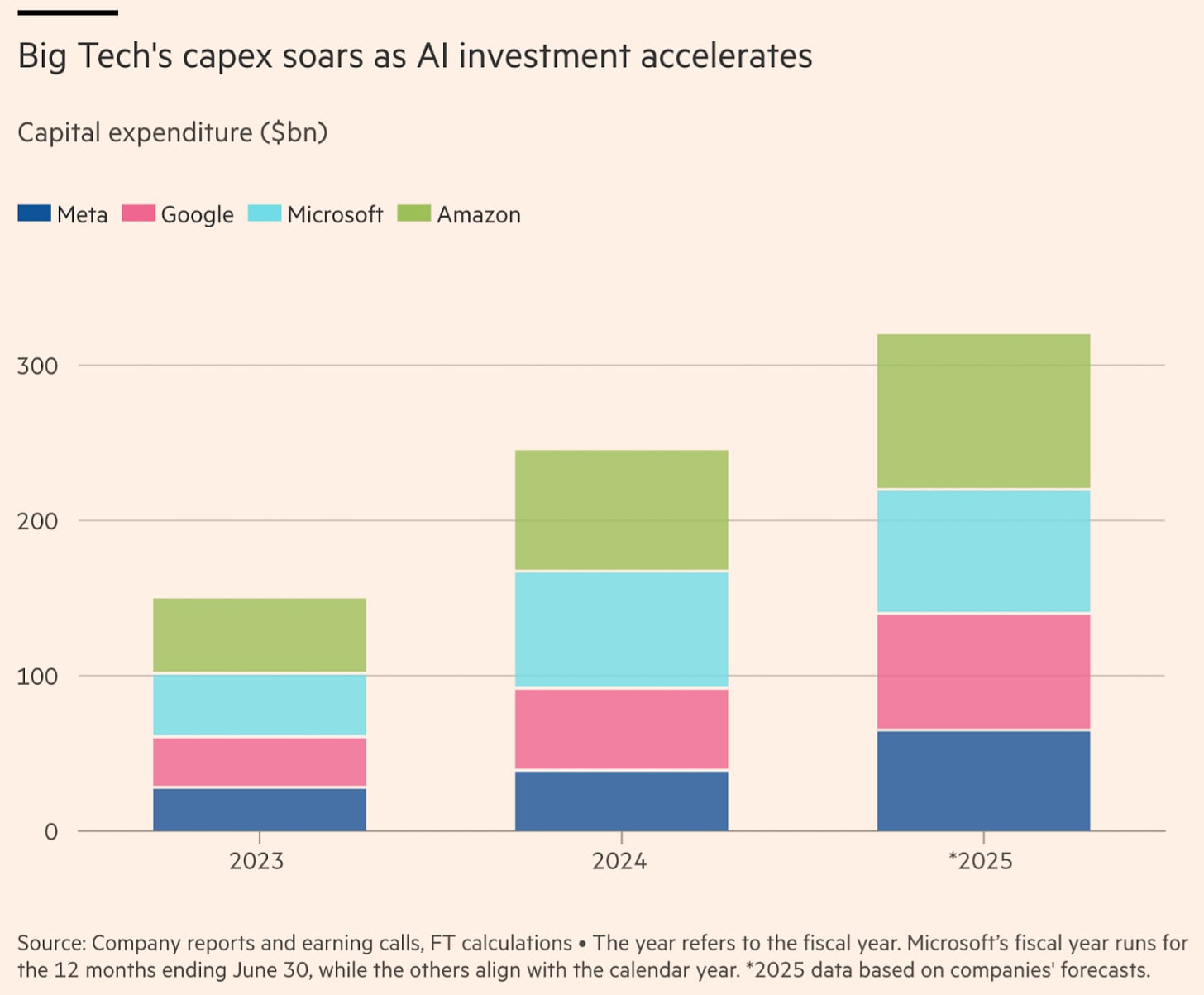
In the second half of last year, I began seeing news reports of mega data center & energy projects across the United States. From Microsoft agreeing to restart one of the units of Three Mile Island to Meta announcing a $10 billion data center project powered by natural gas in Louisiana, it became clear that these large tech companies were very serious about investing in compute and energy.
But what really opened my eyes was this talk given by Eric Schmidt to Stanford graduate students in August 2024.
If you skip to about the 7:30 mark, he says the following:
I talked to Sam Altman [he] is a close friend.
He believes that it's going to take about 300 billion, maybe more.
I pointed out to him that I'd done the calculation on the amount of energy required.
And I, and I then in the spirit of full disclosure, went to the White House on Friday and told them that we need to become best friends with Canada because Canada has really nice people, helped invent AI, and lots of hydropower.
Because we as a country do not have enough power to do this.
The alternative is to have the Arabs fund it.
And I like the Arabs personally.
I spent lots of time there, right?
But they're not going to adhere to our national security rules.
Whereas Canada and the U.S.
are part of a triumvirate where we all agree.
So these $100 billion, $300 billion data centers, electricity starts becoming the scarce resource.
At the risk of sounding conspiratorial, if Eric Schmidt, who is a very influential figure in the American tech space but not a current executive of a major AI company or one of the Magnificent 7 firms, is going to the White House in August 2024 to tell the administration that the United States needs Canada’s energy potential to satisfy future AI-related energy demand, what kind of conversations were the heads of companies like Google, Meta, Amazon, and Microsoft having with senior administration officials regarding this issue?
After President Trump won the election, it became clear that the leaders of these companies found it very important to be close to the incoming administration.

I found it very interesting that one of the first things President Trump did as President was announce a gigantic AI infrastructure project.

There is no doubt in my mind that the Trump administration is aligned with those in the tech industry who believe that there will be a need to satisfy massive demand for energy and compute. Securing as many resources as possible to achieve this goal is a priority.
Enter Canada
Canada is a very rich nation.
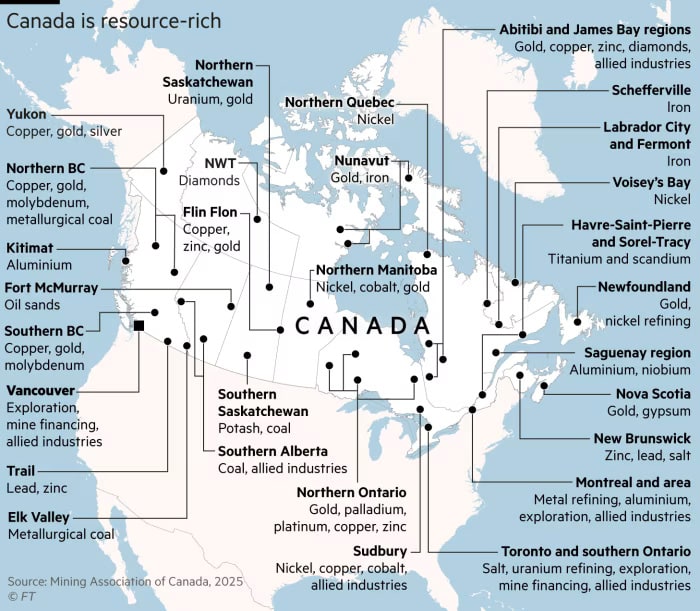
With so much potential, why hasn’t Canada developed most of the resources it possesses?
- Geographical constraints. The southernmost point of Canada sits at 41°N latitude. This means the country faces harsh winters, making development harder and costlier. Some of these resources are located in very remote, difficult-to-reach areas, requiring large upfront costs for infrastructure and development.
- Throughout its history, Canada has taken advantage of some of its resources. However, in the past decade, Canadian society elected a government focused on slower, sustainable growth and carbon emissions mitigation.
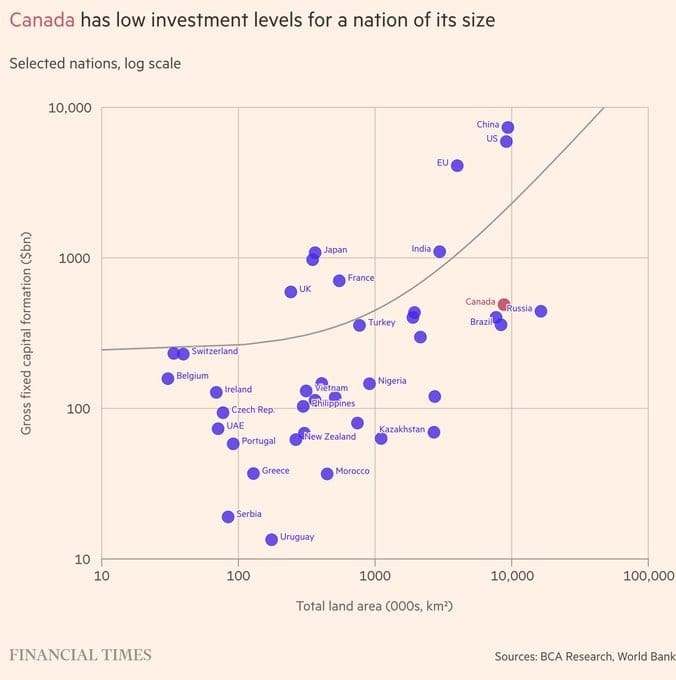
As we enter this new paradigm of exponential energy demand, it appears to coincide with a shift in Canadian society's values from sustainability toward accelerated economic growth. This is reflected in the policies of our upcoming election candidates, Liberal Mark Carney and Conservative Pierre Poilievre.
Even as the two main political parties align on this issue, it still does not resolve the annexation threats that President Trump has repeatedly made since his election. I believe that our future Prime Minister must align with the President and this new paradigm.
What Could Canada’s Future Government Do to Ensure Alignment with the United States' AI Resource Goals?
As soon as possible, the government should come to the table with an offering: Canada’s vast energy and mineral resources will be developed to advance AI in the region.
Here’s how this can be achieved:
- Canada will immediately deploy fiscal resources to accelerate the achievement of this offering.
- Canada will host a business roundtable with major technology companies, energy producers, chip manufacturers, and institutional investors to facilitate AI-related development.
- Canada will undertake a comprehensive immigration review to increase high-skilled labor immigration focused exclusively on AI and energy infrastructure.
- Canada will revise its higher education policies to incentivize young Canadians to study relevant subjects and develop the skills necessary to support AI growth.
If Canada presents a framework similar to this, it will signal to the Trump administration and U.S. technology business leaders that Canada is serious about AI development. I may be wrong about this being the reason President Trump consistently mentions annexing our country, but such a framework would make it clear to him and his advisors that, in matters of AI, we are all on the same page.
Addendum: What about climate change?
The upcoming explosion in energy demand will not discriminate by energy source. If this demand materializes, carbon dioxide emissions will likely continue to increase, and our planet will continue to warm.
According to the latest polling data conducted by Abacus Data, 62% of Canadians still believe climate change is a major concern. However the data also reveals that 72% of Canadians prioritize economic and national issues over climate change. Our potential future Prime Ministers are aware of this.
Looking at the issue from first principles, the problem of climate change can be summarized in one sentence:
Modern human actions emit vast amounts of greenhouse gases into the atmosphere, accelerating global warming and destabilizing the climate.
Human society decided that the main solution to tackle this problem is by reducing our greenhouse gases emissions worldwide.
For decades, global efforts have attempted to reduce emissions through coordination, but these efforts have largely failed. I recently read a post by Maxwell Tabarrok that convinced me technology, not coordination, is the real solution to climate change.
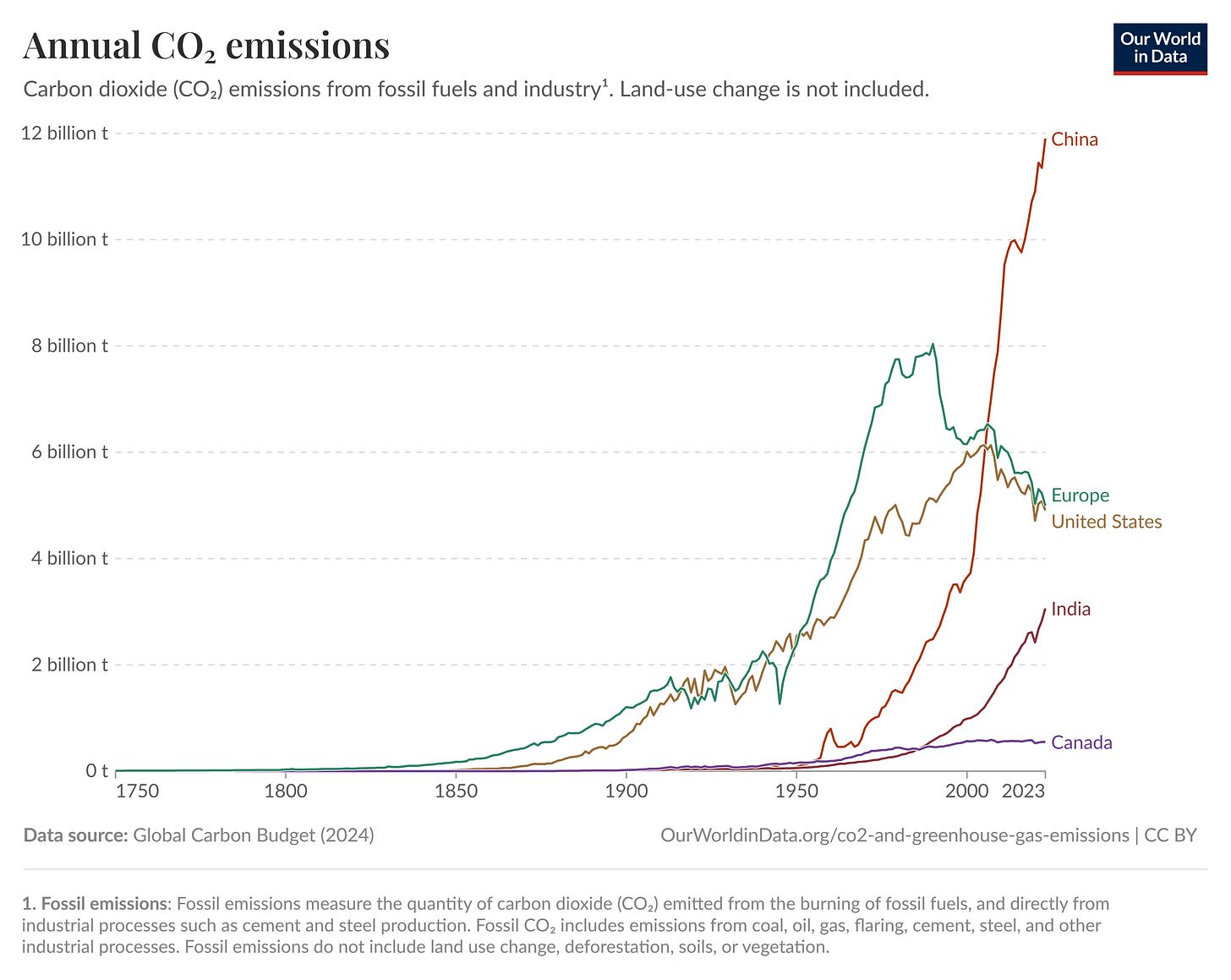
Human society is also trying to solve climate change by developing technologies that capture carbon directly from the atmosphere. This is a very challenging engineering problem to solve, with massive scaling and cost issues. Scientists, engineers, and researchers are already applying AI technology to address this challenge.
One of the most exciting aspects of AI development today is that researchers have discovered that when a reasoning model is provided with vast amounts of computing power, it can reason for longer periods, thereby increasing the probability of producing accurate results. This discovery is currently being tested across several scientific fields, yielding promising results. As AI technology advances, I believe that many of our most difficult engineering problems, including those related to climate change such as effective direct air capture, will be solved within the next decade. This is yet another reason why Canada should collaborate with our American friends in advancing AI technology.
3 comments
Comments sorted by top scores.
comment by Mitchell_Porter · 2025-03-22T09:11:34.065Z · LW(p) · GW(p)
I figured this was part of a 19th-century trend in Trump's thought - mercantilism, territorial expansion, the world system as a game of great powers rather than a parliament of nations. The USA will be greater if it extends throughout the whole of North America, and so Canada must be absorbed.
It hadn't occurred to me that the hunger for resources to train AI might be part of this. But I would think that even if it is part of it, it's just a part.
Replies from: Viliam↑ comment by Viliam · 2025-03-22T17:34:23.093Z · LW(p) · GW(p)
Occam's razor says that Trump makes populist statements that appeal to the kind of person who votes for Trump. Whether those are actually good ideas is irrelevant. Mercantilism sounds good to a person who doesn't know much about economy. Territorial expansion rhymes with "make great".
21st-century economics is just as irrelevant as e.g. 21-st century medicine. Scientists are not an important group of voters.
comment by Mis-Understandings (robert-k) · 2025-03-21T22:29:34.733Z · LW(p) · GW(p)
This is another Trump is insane points.
In short, there is no argument here that the an urgent need to secure and develop Canada’s vast energy and mineral sources
does not imply that the US annexing Canada could do anything about securing those resources as they were already effectively secure. (If things in a close partner are not secure, you have failed at having an alliance).
President Trump believes that annexing Canada is a way to satisfy this need.
This is a trump is insane argument again, since the actions that he is taken deeply problematize those developments. If you were a US export orientated Canadian company, the tarrifs really hurt you.
Even if he is convinced of the previous, acting the way he has been is deeply negative EV on this front, since the Canadian government used to not really care about US dependence, so could send all resouces to the US, if they bid high, but now needs to hedge its bets to limit leverage, so cannot do so.
In short, trade barriers, the current tool, makes it harder for those resources to flow to the US (THey want to find other markets now), and increase difficulites in US investment in Canada (by complicating reverse flows of goods and capital).
Anything about the exploitation of real resources could be done by the Canadian companies if it actually made economic sense. The low investment rate implies that it does not. (The chart says nothing, why would we expect capital investment to correlate with land and not people).
Actually using military force makes everything worse on this acess, so why threaten?